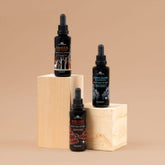
Are Lion's Mane Mushrooms Psychedelic?
Lion’s mane mushrooms have been gaining all of the hype lately due to their positive effects on the mind and body. If you’re wondering whether or not these mushrooms have psychoactive properties, you’re not alone.
Lion’s mane is not a psychedelic mushroom. They will not make you hallucinate or drastically alter your perception or feelings. However, these culinary and medicinal mushrooms have many potential health benefits, especially for mood and cognitive health. Lion’s mane mushrooms are considered adaptogens, which help you manage stress and maintain balance without any hallucinogenic effects.
Difference between adaptogenic mushrooms and psychedelic ones
As previously mentioned, adaptogens are any natural plant substances, like plants and fungi, which have been shown to reduce the negative effects of stress within the body. According to many clinical trials, adaptogens have been shown to have antidepressant effects and help reduce mental exhaustion while increasing mental capacity against stress and fatigue.
“Magic mushrooms,” on the other hand, contain psychedelic compounds called psilocybin and psilocin. These compounds can be found in a variety of mushrooms all over the world and have been used by indigenous cultures for spiritual and medicinal effects.
Psychedelic mushrooms can alter consciousness, and recent research has found that they can help treat individuals with mental health conditions through psychedelic-assisted therapy. Though these types of mushrooms carry their own therapeutic benefits, they are a special medicine that should be approached with caution and under the guidance of trained professionals.
Although lion’s mane mushrooms lack psychedelic properties, they can be combined with psychedelic mushrooms in what’s known as a Stamet’s stack. This innovative approach of microdosing psilocybin mushrooms was created by renowned mycologist Paul Stamets and recently patented as a subject of a drug development push. The Stamet’s Stack combines psilocybin with lion’s mane mushrooms with niacin (Vitamin B3), which allegedly increases the effects of both mushrooms.
What are the main compounds in lion’s mane?

The lion’s mane mushroom (Hericium erinaceus) has many active compounds that contribute to its medicinal nature. These compounds work together to provide a wide array of therapeutic effects. Some of the top beneficial compounds found in lion’s mane are:
Erinacines and hericenones
The two main compounds unique to lion’s mane are erinacines and hericenones. There are fifteen types of erinacine compounds found in lion’s mane and eight in hericenones. Erinacines are located in the mushroom’s mycelium, while hericenones are found in the fruiting body.
Both bioactive compounds have shown promise in stimulating the production of nerve growth factors (NGFs), which helps is an essential factor in regulating the growth, maintenance, and development of neurons in the brain.
Polysaccharides
Lion’s mane contains various polysaccharides, which are long-chain carbohydrates that play a significant role in energy storage, cell communication, and structural support. Natural polysaccharides also have antioxidant effects which help protect cells against damage from free radicals.
The most notable polysaccharide in many functional mushrooms is beta-glucans. These soluble fibers can have many positive effects on health, such as immune system modulation, blood sugar regulation, and cholesterol management.
Polyphenols
Like polysaccharides, polyphenols also have antioxidant properties, which can help prevent the formation of some diseases like cancer, inflammation, and heart disease. Polyphenols have also been found to help improve blood pressure, insulin resistance, and inflammation in the body (1).
Are there any risks or side effects of lion’s mane?

Lion’s mane mushrooms are generally regarded as safe for consumption. However, if you have a history of being allergic to other mushrooms, we don’t recommend trying lion’s mane without consulting a medical professional first, as you may have an allergic reaction to it.
Some individuals who are sensitive to high amounts of fiber may have minor gastrointestinal discomforts such as bloating, gas, or nausea after eating lion’s mane. One way to reduce digestive issues is to begin by consuming only small amounts of the mushroom first or using lion’s mane supplements that contain concentrated forms of it instead of eating large quantities.
It’s important to note that while whole lion’s mane mushrooms are usually well tolerated, mushroom supplements have higher amounts of active compounds that can potentially interfere with certain medications, such as ones that treat blood clotting and diabetes. Nonetheless, outside of these circumstances, lion’s mane and its extracts are typically safe for most individuals for daily use. Of course, with any change in your health routines, always consult your physician if you have any concerns.
Health benefits of lion’s mane mushrooms

Traditional Chinese Medicine (TCM) has boasted about the potential benefits of lion’s mane mushrooms for hundreds of years. As modern science catches up to these claims, studies have found evidence that these mushrooms do, in fact, have many exciting effects on overall health and well-being.
Enhanced brain function and nervous system support
One of the most notable health benefits of lion’s mane is its ability to support brain health. Lion’s mane is considered a natural nootropic or “smart drug.” Nootropics may improve cognitive functions like memory, attention, focus, and mental clarity.
According to one recent study, the combination of compounds in lion’s mane helps stimulate neurogenesis and promote neuron connectivity, ultimately leading to better communication between brain cells (2). In addition, lion’s mane has been shown to potentially prevent mild cognitive impairment (MCI) and Alzheimer’s disease with promising results from several preclinical studies.
Immune system and digestive support
Lion’s mane can help strengthen the body’s defense against pathogens and illnesses by stimulating the production of important immune cells (3). The anti-inflammatory properties of lion’s mane compounds further support a healthy immune system and prevent illnesses from forming and spreading throughout the body.
Lion’s mane also promotes the growth of beneficial gut bacteria, notably species of Lactobacillus and Bifidobacterium. These bacteria help with digestion and a balanced gut environment, ultimately boosting the body’s immune response.
Mental health and mood enhancement
Lion’s mane is believed to have antidepressant and mood-regulating properties and could be a potential alternative for treating some mental health conditions. In one animal study, lion’s mane was found to restore levels of important mood-stabilizing neurotransmitters like dopamine, serotonin, and norepinephrine (4). Another clinical study examined 77 volunteers who took lion’s mane supplements daily for eight weeks. According to the end results, the participants displayed a significant reduction in anxiety, depression, binge eating, and sleep disorders (5).
Incorporating lion’s mane into your wellness routine

If you’d like to reap all the benefits of lion’s mane but don’t know where to start, you should consider gradually adding it as a part of your routine. Dietary supplementation of lion’s mane mushrooms is something you can do safely on a daily basis. Unlike a lot of functional mushrooms, lion’s mane has a delicious taste and texture that many people compare to seafood. Though lion’s mane should never be eaten raw, cooking the mushroom can degrade some of the natural compounds that give it such unique health benefits.
Fresh lion’s mane is also challenging to come by since it seldom appears on the shelves of your standard grocery store. Fortunately, you can consume concentrated amounts of the mushroom’s bioactive compounds through an easy-to-take lion’s mane extract.
High-quality mushroom extracts carry all of the health-promoting benefits without the hassle. You should always opt for a tincture that uses the dual-extraction method (alcohol and hot water extraction) since separate compounds are pulled out from different processes.
Also, ensure your lion’s mane extract is derived from 100% fruiting bodies of the mushroom, as supplements from mycelium often contain excessive grain substrate, leading to a higher concentration of fillers and fewer beneficial compounds.
To integrate lion’s mane into your routine and ensure you receive your daily dose of lion’s mane goodness, simply add a dropper full of the extract to a glass of water or your morning cup of joe.
By following these guidelines and seeking out reliable sources for high-quality lion’s mane extracts, you can fully enjoy the numerous health benefits this fantastic fungus has to offer.
References
-
Rana, Ananya, Mrinal Samtiya, Tejpal Dhewa, Vijendra Mishra, and Rotimi E. Aluko. 2022. “Health Benefits of Polyphenols: A Concise Review.” Journal of Food Biochemistry 46 (10). https://doi.org/10.1111/jfbc.14264.
-
Martínez‐Mármol, Ramón, YeJin Chai, Jacinta N. Conroy, Zahra Khan, Seong‐Min Hong, Seon Beom Kim, Rachel S. Gormal, et al. 2023. “Hericerin Derivatives Activates a Pan‐Neurotrophic Pathway in Central Hippocampal Neurons Converging to ERK1 /2 Signaling Enhancing Spatial Memory.” Journal of Neurochemistry 165 (6). https://doi.org/10.1111/jnc.15767.
-
Sheng, Xiaotong, Jingmin Yan, Yue Meng, Yuying Kang, Zhen Han, Guihua Tai, Yifa Zhou, and Hairong Cheng. 2017. “Immunomodulatory Effects of Hericium Erinaceus Derived Polysaccharides Are Mediated by Intestinal Immunology.” Food & Function 8 (3): 1020–27. https://doi.org/10.1039/c7fo00071e.
-
Chiu, Chun-Hung, Charng-Cherng Chyau, Chin-Chu Chen, Li-Ya Lee, Wan-Ping Chen, Jia-Ling Liu, Wen-Hsin Lin, and Mei-Chin Mong. 2018. “Erinacine A-Enriched Hericium Erinaceus Mycelium Produces Antidepressant-like Effects through Modulating BDNF/PI3K/Akt/GSK-3β Signaling in Mice.” International Journal of Molecular Sciences 19 (2): 341. https://doi.org/10.3390/ijms19020341.
-
Vigna, Luisella, Federica Morelli, Gianna M. Agnelli, Filomena Napolitano, Daniela Ratto, Alessandra Occhinegro, Carmine Di Iorio, et al. 2019. “Hericium Erinaceus Improves Mood and Sleep Disorders in Patients Affected by Overweight or Obesity: Could Circulating Pro-BDNF and BDNF Be Potential Biomarkers?” Evidence-Based Complementary and Alternative Medicine 2019 (April): 1–12. https://doi.org/10.1155/2019/7861297.



